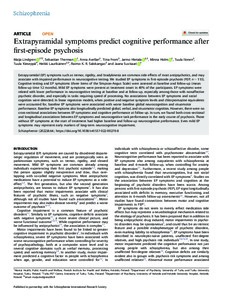Extrapyramidal symptoms predict cognitive performance after first-episode psychosis
Lindgren Maija; Therman Sebastian; Avellan Anna; From Tiina; Hietala Jarmo; Holm Minna; Ilonen Tuula; Kieseppä Tuula; Laurikainen Heikki; Salokangas Raimo K. R.; Suvisaari Jaana
https://urn.fi/URN:NBN:fi-fe2022091358906
Tiivistelmä
Extrapyramidal (EP) symptoms such as tremor, rigidity, and bradykinesia are common side effects of most antipsychotics, and may associate with impaired performance in neurocognitive testing. We studied EP symptoms in first-episode psychosis (FEP; n = 113). Cognitive testing and EP symptoms (three items of the Simpson-Angus Scale) were assessed at baseline and follow-up (mean follow-up time 12 months). Mild EP symptoms were present at treatment onset in 40% of the participants. EP symptoms were related with lower performance in neurocognitive testing at baseline and at follow-up, especially among those with nonaffective psychotic disorder, and especially in tasks requiring speed of processing. No associations between EP symptoms and social cognition were detected. In linear regression models, when positive and negative symptom levels and chlorpromazine equivalents were accounted for, baseline EP symptoms were associated with worse baseline global neurocognition and visuomotor performance. Baseline EP symptoms also longitudinally predicted global, verbal, and visuomotor cognition. However, there were no cross-sectional associations between EP symptoms and cognitive performance at follow-up. In sum, we found both cross-sectional and longitudinal associations between EP symptoms and neurocognitive task performance in the early course of psychosis. Those without EP symptoms at the start of treatment had higher baseline and follow-up neurocognitive performance. Even mild EP symptoms may represent early markers of long-term neurocognitive impairment.
Kokoelmat
- Rinnakkaistallenteet [29335]
